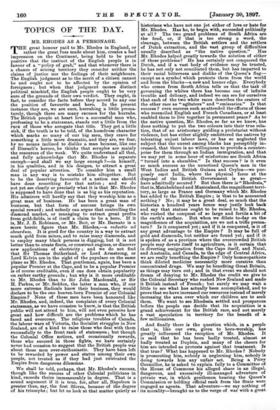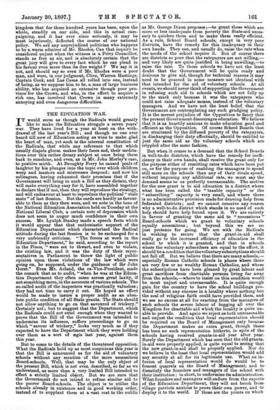TOPICS OF THE DAY.
MR. RHODES AS A PERSONAGE. THE great honour paid to Mr. Rhodes in England, or rather the great fuss made about him, creates a bad impression on the Continent, being held to be proof positive that the instinct of the English people is in favour of a "policy of grab," and that whenever there is a chance of seizing territory they consider neither the claims of justice nor the feelings of their neighbours. The English judgment as to the merit of a citizen cannot be and ought not to be affected by the opinion of foreigners ; but when that judgment causes distinct political mischief, the English people ought to be very sure of the grounds of their own verdict. They ought, in fact, to consider the facts before they accord to any one the position of favourite and hero. In the present instance they are, we are sure, hurrahing a little prema- turely, though there are many excuses for the hurrahs. The British people at heart love a successful man who, professing to be a statesman, stands out a little from the ruck of those who arrogate that title. They get a little sick, if the truth is to be told, of the humdrum character which marks so many of our big men, they crave for something a little more dramatic, and they are, we fear, by no means inclined to dislike a man because, like one of Disraeli's heroes, he thinks that scruples are mainly the resources of the weak. We quite understand all that, and fully acknowledge that Mr. Rhodes is separate enough—and shall we say large enough ?—in himself, in his qualities, and in his designs, to attract a great deal of popular attention. To consider him a small man in any way is to mistake him altogether. But to be the deserving favourite of a nation one should have done something for that nation ; and we do not yet see clearly or precisely what it is that Mr. Rhodes is supposed to have done that is as big as his reputation. His admirers will hardly say that they worship him as a great man of business. He has been a. great man of business, but that form of success brings its own special reward ; and nobody can argue that controlling the diamond market, or managing to extract great profits from gold-fields, is of itself a claim to be a hero. If it is, Mr. J. B. Robinson, or Mr. Belt, or Mr. Barnato is a more heroic figure than Mr. Rhodes,—a reductio ad absurdum. It is good for the country in a way to extract much gold from mines, and to raise many diamonds, and to employ many black persons in digging, but it is not better than to create fleets, or construct engines, or discover new applications of electricity ; and we do not find that Sir Thomas Sutherland, or Lord Armstrong, or Lord Kelvin are in the sight of the populace on the same plane as Mr. Rhodes. That gentleman, again, has been a popular Premier at the Cape, and to be a popular Premier is of course creditable, even if one does obtain popularity on rather earthy grounds ; but why is it more creditable to Mr. Rhodes than to Sir John Macdonald, or Sir H. Parkes, or Mr. Seddon, the latter a man who, if our more extreme Radicals knew their business, they would declare to be the one heaven-born Premier of our Colonial Empire? None of these men have been honoured like Mr. Rhodes, and, indeed, the complaint of every Colonial statesman, as we have occasion to knew, is that the British public will not attend to him, will not even perceive how great and how difficult are the problems which he has faced and overcome. The religious troubles of Canada, the labour wars of Victoria, the Socialist struggles in New Zealand, are of a kind to raise those who deal with them successfully to the front rank of statesmen ; but though the Colonial Office notices, and occasionally rewards, those who succeed in those fights, we have certainly never had occasion to suggest that the British people was about these men over-enthusiastic. They have been left to be rewarded by power and status among their own people, not treated as if they had just extricated the Empire from dangerous dilemmas.
We shall be told, perhaps, that Mr. Rhodes's success, though like the success of other Colonial politicians in kind, exceeds theirs immeasurably in degree. That is a sound argument if it is true, for, after all, Napoleon is greater than, say, the first Sforza, because of the degree of his triumphs ; but let us look at that matter quietly as historians who have not one jot either of love or hate for Mr. Rhodes. Has he, to begin with, succeeded politically at all ? The two grand problems of South Africa are the feud, or, if that is too strong a word, the cleavage, between the British settlers and the settlers of Dutch extraction, and the vast group of difficulties usually described as "the native question." Has Mr. Rhodes helped greatly towards the solution of either of these problems? He has certainly not conquered the Dutch, and if a vast body of evidence may be trusted, he has not only not conciliated them, but has imparted to their racial bitterness and dislike of the Queen's flag— except as a symbol which protects them from the world and from the blacks—a new and keener edge. Everybody who comes from South Africa tells us that the task of governing the whites there has become one of infinite trouble and delicacy, and indeed we can see for ourselves that each of the two white races describes the orators of the other race as "agitators" and "emissaries." Is that success ? even success such as attended the efforts of those who reconciled English and French Canadians, or at least enabled them to live together in permanent peace ? As to. the native question, Mr. Rhodes, so far as we know, has done nothing to put the two colours into their true rela- tion, that of an aristocracy guiding a proletariat without violence, but has either slightly embittered the natives by tolerating unjust labour laws, or has so neglected the subject that the unrest among blacks has perceptibly in- creased, that there is no willingness to provide a counter- poise for them through an Indian immigration, and that we may yet in some hour of misfortune see South Africa, "turned into a shambles." Is that success ? is it even so much success as the unnoticed Queen's men in the West Indies and British Guiana and Ceylon—we pr. posely omit India, where the physical force at the disposal of the British Government is so great— have admittedly secured ? But then there is "Rhodesia," that is, Matabeleland and Manicaland, the magnificent ten-i- tory, as large as France and Germany which Mr. Rhodes has added to the British Empire ; is that to be accounted nothing ? No; it may be a great deal, so much that the historian a hundred years hence may justly look back and say that statues ought to be raised to Mr. Rhodes, who rushed the conquest of so large and fertile a bit of the earth's surface. But when we dilate to-day on the magnificence of the acquisition, are we not a trifle prem.,- ture ? Is it conquered yet ; and if it is conquered, is it of any great advantage to the Empire ? It may be full of gold and diamonds, but neither are found yet ; and if it is spoken of as a province where the overcrowded British people may devote itself to agriculture, is it certain that in diverting emigration from the Cape itself, and Natal, and Australia, and Canada, to the edge of Central Africa, we are really benefiting the Empire ? Only homceopathists think diluted medicine necessarily more curative than concentrated drugs. We may be benefiting Great Britain, as things may turn out ; and in that event we should not dream of denying to Mr. Rhodes the credit we give to the Colonial Secretary who rushed New Zealand and made it British instead of French ; but surely we may wait a little to see what has actually been accomplished, and to prove that we have increased our resources instead of merely increasing the area over which our children are to seek them. We want to see Rhodesia settled and prosperous before the people can decide that its acquisition is a grand achievement for the British race, and not merely a vast speculation in territory for the benefit of a few millionaires.
And finally there is the question which, in a people that is, like our own, given to hero-worship, has greatly influenced the reception of Mr. Rhodes. It is said that he has been badly treated, almost as badly treated as Dupleix, and many of the cheers for him are intended as protests against that treatment. is that true? What has happened to Mr. Rhodes ? Nobody is prosecuting him, nobody is neglecting him, nobody is doing towards him any unfair act. Being a Privy Councillor, he is asked to explain fully to a Committee of the House of Commons his alleged share in an illegal, dangerous, and excessively ill-managed adventure of private war, in which gentlemen bearing the Queen's Commission or holding official rank from the State were engaged as agents. That adventure—we say nothing of its morality—brought us to the verge of war with a great kingdom that for three hundred years has been, upon the whole, steadily on our side, and this in actual cam- paigning, and it has ever since seriously, it may be most injuriously, deflected the course of our national policy. We ask any unprejudiced politician who happens to be a warm admirer of Mr. Rhodes, Can that inquiry be considered unjust when the witness is a Privy Councilor, stands as free as air, and is absolutely certain that the great jury will give to every fact which he can plead in his favour even more than its due weight ? We say it is not, and should say so even if Mr. Rhodes were a poor man, and were, in our judgment, Clive, Warren Hastings. Captain Cook, and Las Casas all rolled into one, instead of being, as we suppose him to be, a man of large business ability, who has acquired an extensive though poor pro- vince for the Crown, and who, in the effort to acquire a rich one, has involved that Crown in many extremely annoying and even dangerous difficulties.



















































 Previous page
Previous page